Creatine gummies designed for the needs of endurance athletes.
Specifically formulated to be absorbed quickly without the bloated feeling you’ll find with traditional creatine powders.
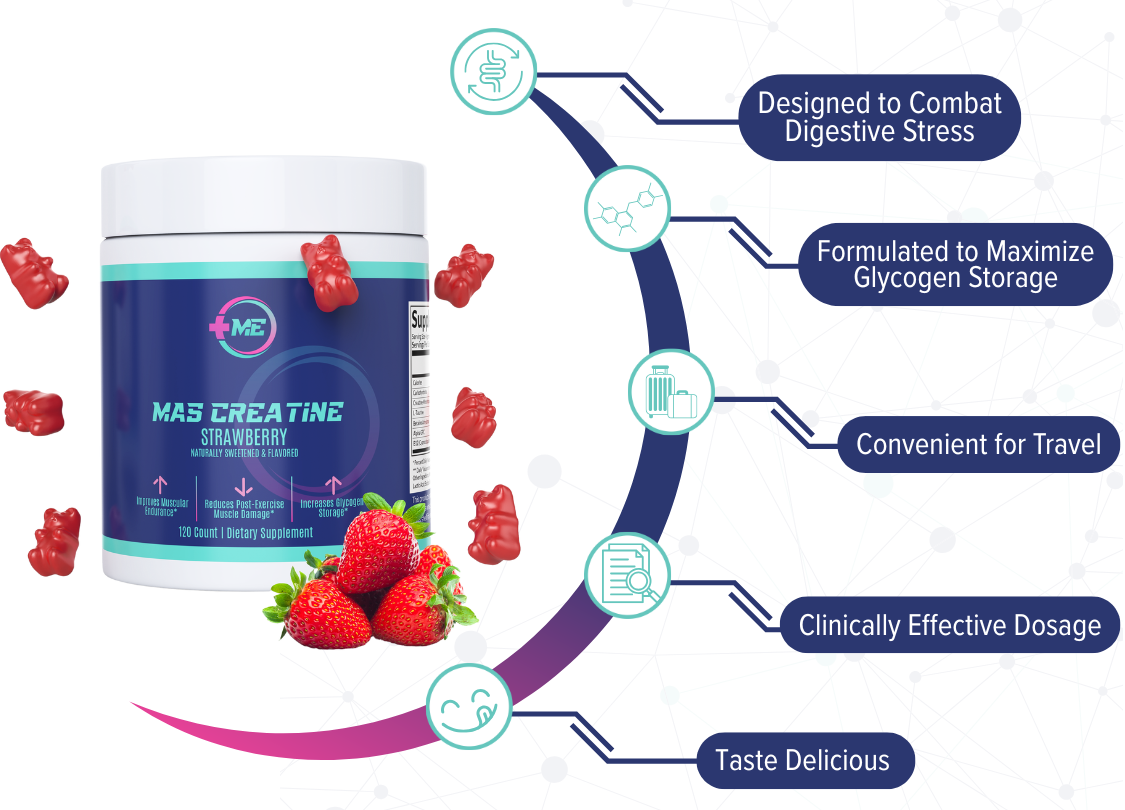
We’ve formulated our Creatine Monohydrate gummies to provide the purest and most effective form of creatine available, with no fillers or unnecessary additives.
Our gummies are designed to be absorbed quickly so it’s gentle on the stomach and doesn’t give you a bloated feeling you’ll find with traditional creatine powders.
What you get is pure, fast-acting creatine that fuels your muscles, enhances your performance and helps you recover every time you train.
Creatine Monohydrate is one of the most researched and effective performance-enhancing supplements available.
It is a natural compound made up of the amino acids L-arginine, glycine, and methionine.
Research shows that supplementing with Creatine Monohydrate helps ATP regeneration, promoting a steady supply of energy to power through high-intensity exercise.
This helps you train harder, push longer and recover faster—ultimately delivering better results from your training and supporting overall health.
Specifically, the research shows that creatine can….
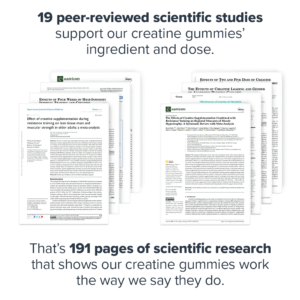
Often seen as a supplement just for weightlifters, creatine is now supported by decades of clinical research showing significant benefits for muscle recovery, cellular repair, and exercise performance in all types of athletes—including runners, cyclists, swimmers, and triathletes.
Here’s how…
1. Reduces Exercise-Induced Muscle Damage and Inflammation
Several studies indicate creatine helps mitigate muscle cell damage and decrease markers of inflammation, such as creatine kinase (CK) and lactate dehydrogenase (LDH), following prolonged or intense exercise.
➤ Practical Outcome: Less DOMS (delayed onset muscle soreness), quicker return to training, and enhanced tissue repair.
📚 Cooke et al., 2009 “Creatine supplementation reduces muscle cell damage and inflammation following a marathon run.”
📚 Bassit et al., 2008 “Creatine supplementation reduced pro-inflammatory markers and muscle soreness after a 30km race.”
2. Accelerates ATP Resynthesis for Faster Recovery Between Sessions
Creatine’s primary function is to increase phosphocreatine stores in muscle tissue, which helps regenerate adenosine triphosphate (ATP)—the energy currency of your cells.
During high-volume aerobic or interval work, ATP is rapidly depleted. Supplementing with creatine accelerates ATP resynthesis, reducing fatigue and enabling quicker recovery between training bouts.
➤ Practical Outcome: Reduced rest time, improved repeat performance, and less post-session fatigue.
📚 Balsom et al., 1994; Greenhaff et al., 1993 “Creatine supplementation results in faster recovery of phosphocreatine during repeated bouts of exercise.”
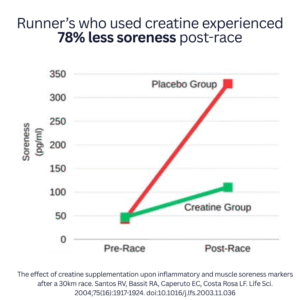
Backed by hundreds of peer-reviewed studies, creatine monohydrate is one of the most effective and safe compounds for preserving lean mass and enhancing strength—particularly in adults over 35
Here’s a look at some of the specifics…
Starting around age 30, most adults begin losing 3–8% of muscle mass per decade.
Creatine not only improves training output but also helps preserve and build muscle mass—critical for recovery, injury prevention, and long-term performance.
➤ Practical Outcome: Greater muscle retention, reduced injury risk, and better metabolic recovery after each session.
📚 Candow et al., 2014
“Creatine supplementation during resistance training in older adults resulted in significantly greater gains in lean tissue mass and muscular strength compared to placebo.”
📚 Chilibeck et al., 2017
“Meta-analysis of 22 studies showed older adults supplementing with creatine gained ~1.4 kg more lean mass on average than non-users during training.”
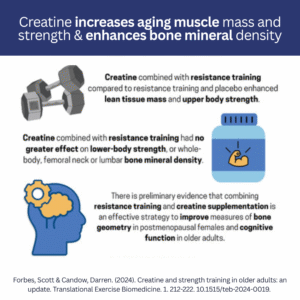
Endurance athletes often overlook creatine—assuming it’s just for lifters and sprinters. But the latest research tells a different story.
Creatine plays a direct and powerful role in sustaining high-effort performance, improving aerobic and anaerobic efficiency, and helping athletes train longer with less fatigue.
1. Increases Mitochondrial Efficiency
Newer studies suggest creatine doesn’t just fuel short bursts—it may also enhance aerobic metabolism by improving mitochondrial efficiency and biogenesis (creation of new mitochondria), especially when combined with endurance training.
➤ Practical Outcome: Better stamina. Improved energy utilization. Less bonking during long efforts.
📚 Safdar et al., 2011
“Creatine increased expression of genes involved in mitochondrial function and oxidative phosphorylation.”
📚 Eijnde et al., 2003
“Creatine combined with aerobic training increased mitochondrial markers and oxidative capacity.”
2. Buffers Fatigue by Reducing Acidosis
During prolonged or intense aerobic activity, lactic acid builds up and decreases muscle pH, leading to burning sensations and early fatigue.
Creatine acts as a buffer, helping neutralize hydrogen ions and delay the onset of muscle acidosis.
➤ Practical Outcome: Maintain pace longer during tempo efforts, threshold workouts, and races.
📚 Santos et al., 2004
“Creatine supplementation attenuated lactate accumulation and improved fatigue resistance during repeated effort.”
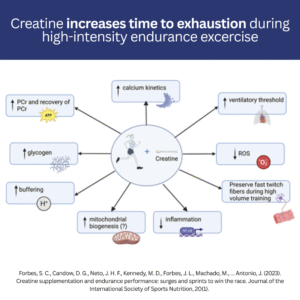
When it comes to endurance performance, glycogen is king.
It’s the primary fuel your muscles use during long-duration efforts—and once it’s gone, so is your speed, power, and drive.
What most endurance athletes don’t realize is that creatine doesn’t just help with strength or sprint power—it also increases your muscles’ ability to store glycogen.
Here’s a look at some of the research…
1. Increases Muscle Glycogen Storage When Paired With Carbohydrates
Creatine increases glycogen storage by up to 50% when taken alongside carbohydrates.
It does this by enhancing cellular hydration and glucose transporter activity (GLUT-4), which improves glucose uptake into muscle tissue.
📚 Roberts et al., 1998
“Creatine supplementation with carbohydrate loading resulted in significantly higher muscle glycogen content compared to carbohydrate alone.”
📚 Nelson et al., 2001
“Creatine increased muscle glycogen resynthesis post-exercise, suggesting an enhanced ability to store fuel during recovery.”
2. Improves Glycogen Resynthesis Post-Exercise
After depleting glycogen through endurance exercise, your muscles are in a prime state to refuel.
Creatine helps accelerate glycogen resynthesis, which means faster recovery and readiness for your next session.
📚 Van Loon et al., 2004
“Creatine supplementation enhanced post-exercise glycogen resynthesis in combination with carbohydrate intake.”
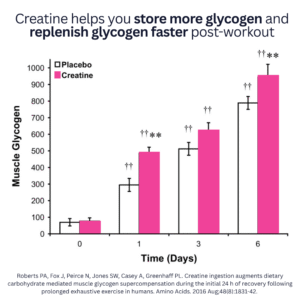
Creatine Monohydrate is one of the most researched and effective performance-enhancing supplements available.
It is a natural compound made up of the amino acids L-arginine, glycine, and methionine.
Research shows that supplementing with Creatine Monohydrate helps ATP regeneration, promoting a steady supply of energy to power through high-intensity exercise.
This helps you train harder, push longer and recover faster—ultimately delivering better results from your training and supporting overall health.
Specifically, the research shows that creatine can….
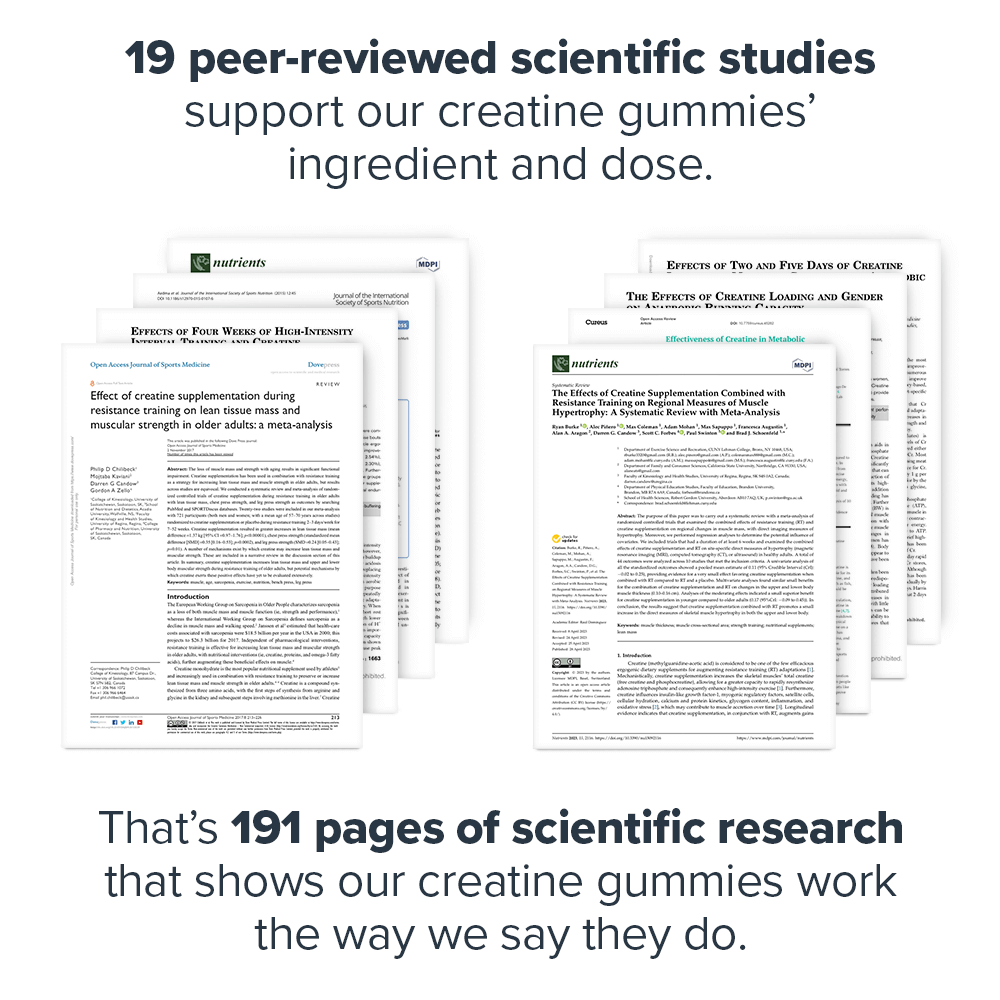
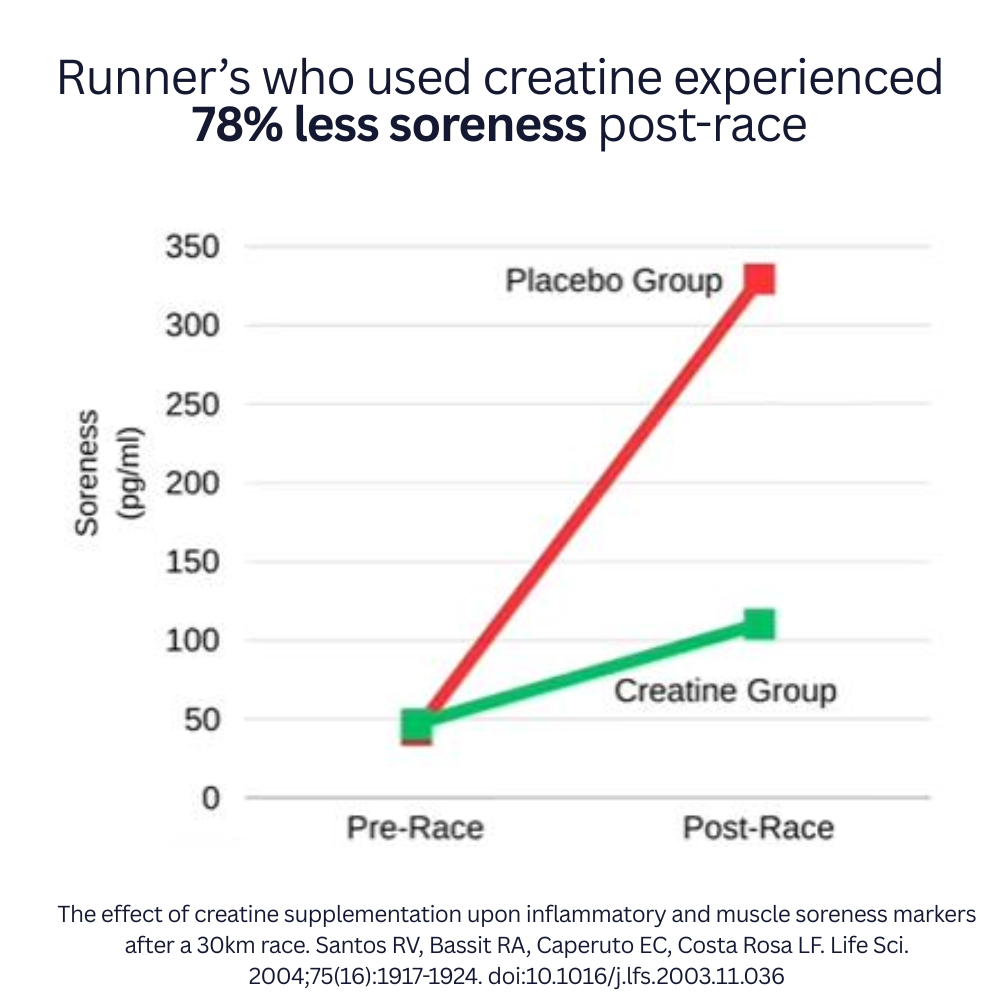
Often seen as a supplement just for weightlifters, creatine is now supported by decades of clinical research showing significant benefits for muscle recovery, cellular repair, and exercise performance in all types of athletes—including runners, cyclists, swimmers, and triathletes.
Here’s how…
1. Reduces Exercise-Induced Muscle Damage and Inflammation
Several studies indicate creatine helps mitigate muscle cell damage and decrease markers of inflammation, such as creatine kinase (CK) and lactate dehydrogenase (LDH), following prolonged or intense exercise.
➤ Practical Outcome: Less DOMS (delayed onset muscle soreness), quicker return to training, and enhanced tissue repair.
📚 Cooke et al., 2009 "Creatine supplementation reduces muscle cell damage and inflammation following a marathon run."
📚 Bassit et al., 2008 "Creatine supplementation reduced pro-inflammatory markers and muscle soreness after a 30km race."
2. Accelerates ATP Resynthesis for Faster Recovery Between Sessions
Creatine's primary function is to increase phosphocreatine stores in muscle tissue, which helps regenerate adenosine triphosphate (ATP)—the energy currency of your cells.
During high-volume aerobic or interval work, ATP is rapidly depleted. Supplementing with creatine accelerates ATP resynthesis, reducing fatigue and enabling quicker recovery between training bouts.
➤ Practical Outcome: Reduced rest time, improved repeat performance, and less post-session fatigue.
📚 Balsom et al., 1994; Greenhaff et al., 1993 "Creatine supplementation results in faster recovery of phosphocreatine during repeated bouts of exercise."
Backed by hundreds of peer-reviewed studies, creatine monohydrate is one of the most effective and safe compounds for preserving lean mass and enhancing strength—particularly in adults over 35
Here’s a look at some of the specifics…
Starting around age 30, most adults begin losing 3–8% of muscle mass per decade.
Creatine not only improves training output but also helps preserve and build muscle mass—critical for recovery, injury prevention, and long-term performance.
➤ Practical Outcome: Greater muscle retention, reduced injury risk, and better metabolic recovery after each session.
📚 Candow et al., 2014
"Creatine supplementation during resistance training in older adults resulted in significantly greater gains in lean tissue mass and muscular strength compared to placebo."
📚 Chilibeck et al., 2017
"Meta-analysis of 22 studies showed older adults supplementing with creatine gained ~1.4 kg more lean mass on average than non-users during training."
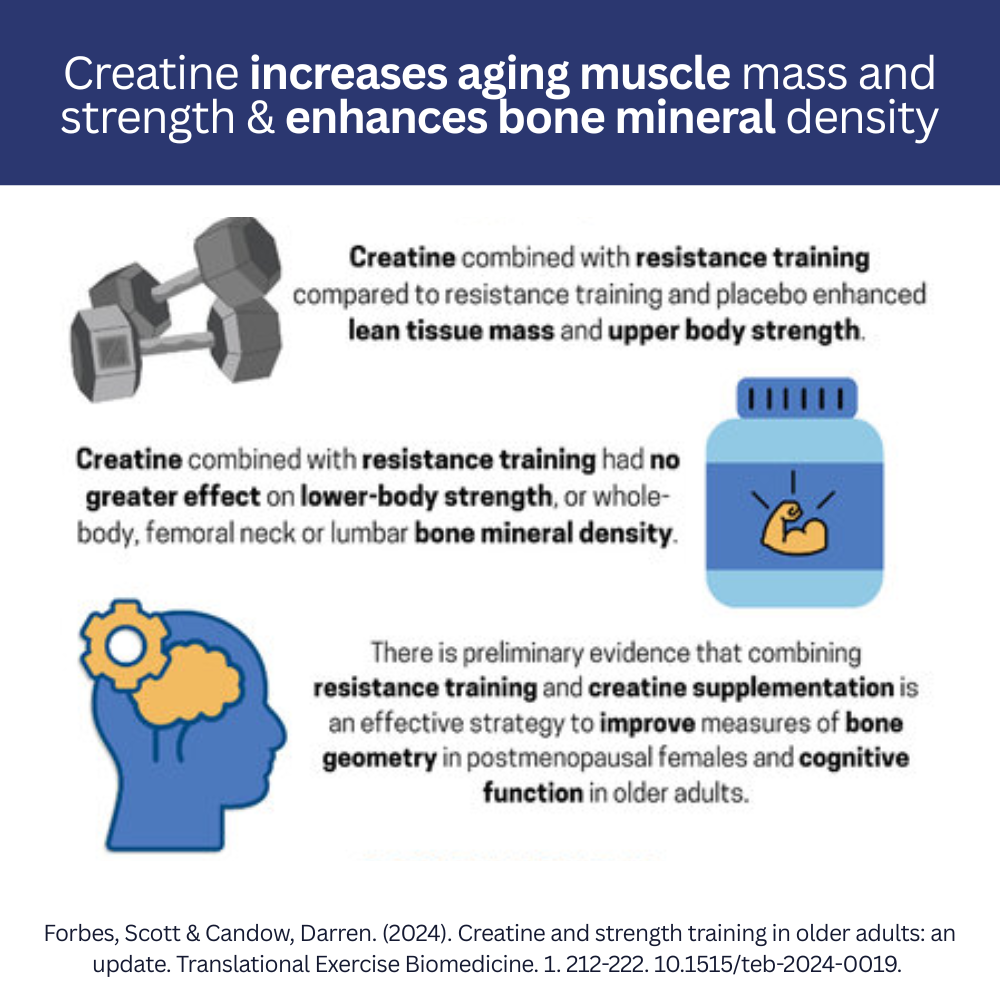
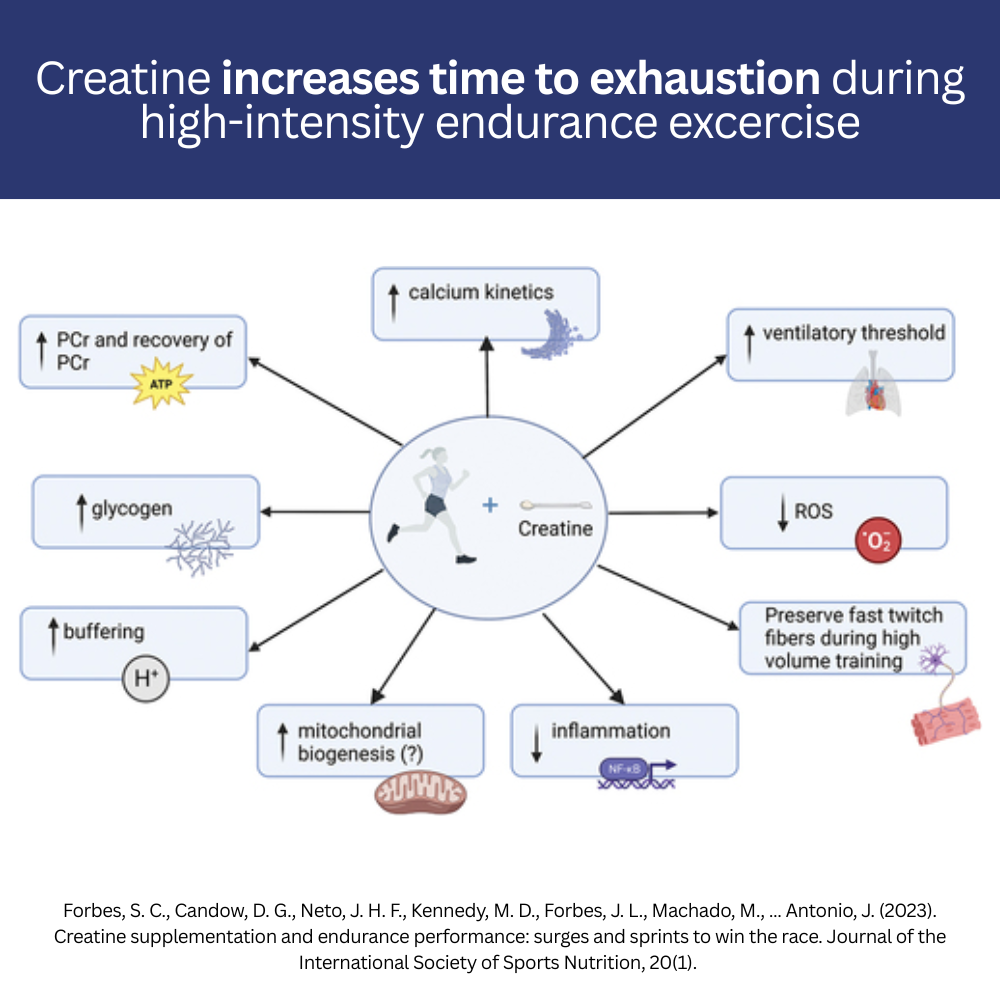
Endurance athletes often overlook creatine—assuming it’s just for lifters and sprinters. But the latest research tells a different story.
Creatine plays a direct and powerful role in sustaining high-effort performance, improving aerobic and anaerobic efficiency, and helping athletes train longer with less fatigue.
1. Increases Mitochondrial Efficiency
Newer studies suggest creatine doesn’t just fuel short bursts—it may also enhance aerobic metabolism by improving mitochondrial efficiency and biogenesis (creation of new mitochondria), especially when combined with endurance training.
➤ Practical Outcome: Better stamina. Improved energy utilization. Less bonking during long efforts.
📚 Safdar et al., 2011
"Creatine increased expression of genes involved in mitochondrial function and oxidative phosphorylation."
📚 Eijnde et al., 2003
"Creatine combined with aerobic training increased mitochondrial markers and oxidative capacity."
2. Buffers Fatigue by Reducing Acidosis
During prolonged or intense aerobic activity, lactic acid builds up and decreases muscle pH, leading to burning sensations and early fatigue.
Creatine acts as a buffer, helping neutralize hydrogen ions and delay the onset of muscle acidosis.
➤ Practical Outcome: Maintain pace longer during tempo efforts, threshold workouts, and races.
📚 Santos et al., 2004
"Creatine supplementation attenuated lactate accumulation and improved fatigue resistance during repeated effort."
When it comes to endurance performance, glycogen is king.
It's the primary fuel your muscles use during long-duration efforts—and once it's gone, so is your speed, power, and drive.
What most endurance athletes don’t realize is that creatine doesn’t just help with strength or sprint power—it also increases your muscles’ ability to store glycogen.
Here's a look at some of the research...
1. Increases Muscle Glycogen Storage When Paired With Carbohydrates
Creatine increases glycogen storage by up to 50% when taken alongside carbohydrates.
It does this by enhancing cellular hydration and glucose transporter activity (GLUT-4), which improves glucose uptake into muscle tissue.
📚 Roberts et al., 1998
"Creatine supplementation with carbohydrate loading resulted in significantly higher muscle glycogen content compared to carbohydrate alone."
📚 Nelson et al., 2001
"Creatine increased muscle glycogen resynthesis post-exercise, suggesting an enhanced ability to store fuel during recovery."
2. Improves Glycogen Resynthesis Post-Exercise
After depleting glycogen through endurance exercise, your muscles are in a prime state to refuel.
Creatine helps accelerate glycogen resynthesis, which means faster recovery and readiness for your next session.
📚 Van Loon et al., 2004
"Creatine supplementation enhanced post-exercise glycogen resynthesis in combination with carbohydrate intake."
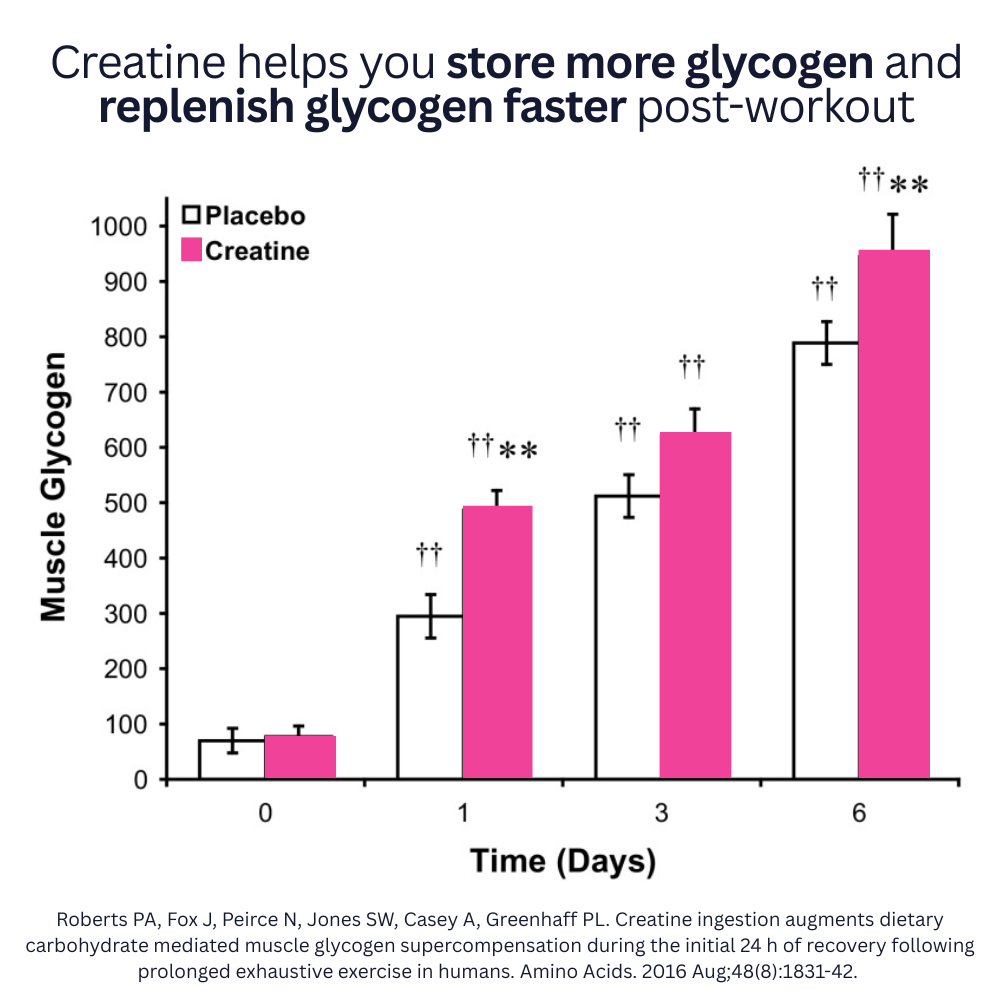
Creatine supplementation works best when your muscles are fully saturated.
To accomplish this, you need to take an effective dose (5 grams) and be consistent.
Traditional creatine powders make this difficult to do because it is easy to forget, it often tastes bad, and you need to mix it with something.
With Creatine Gummies, you get a delicious creatine supplement you look forward to taking everyday.
Plus, they are convenient to take with you for workouts, vacations, and business trips.
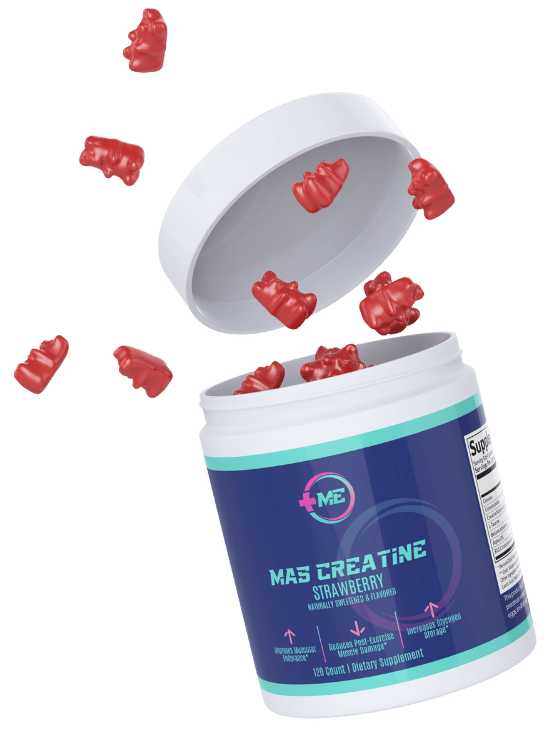
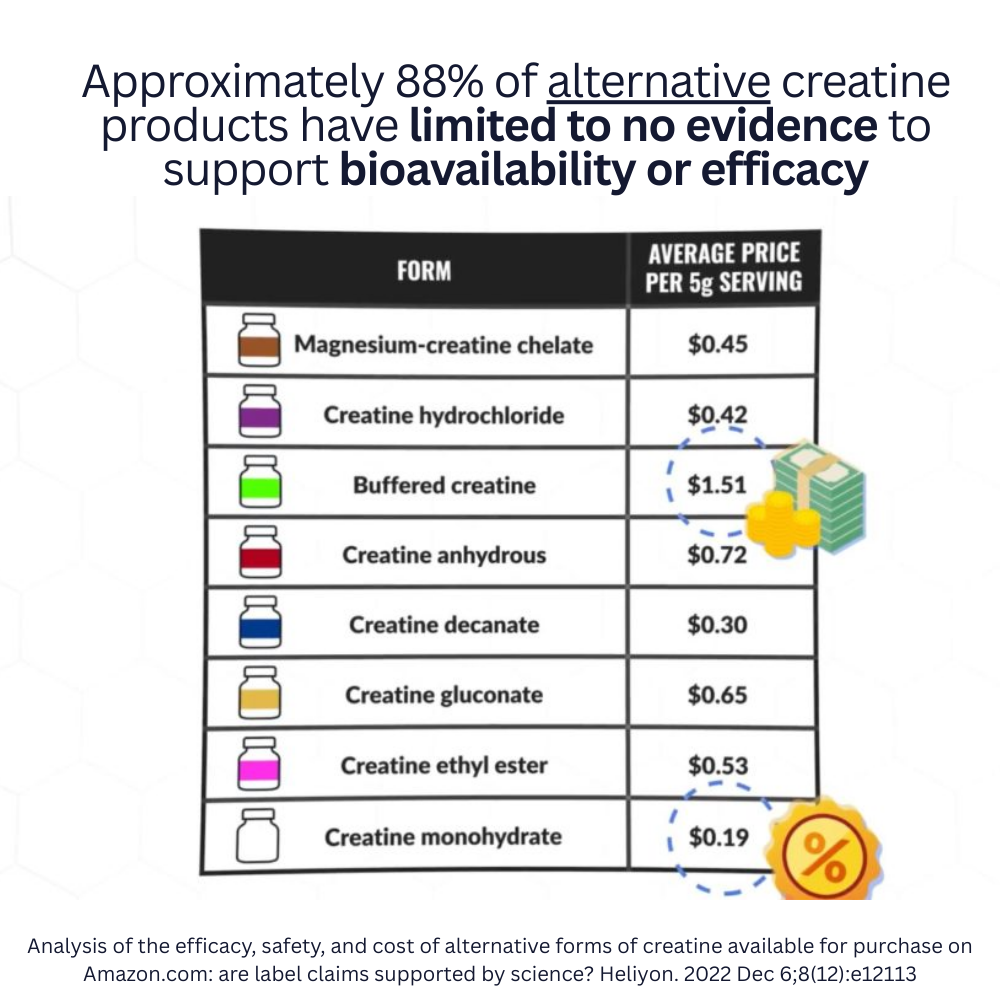
Micronized creatine monohydrate, the type found in MAS Edge Gummies, is the most highly studied and validated form of creatine on the market.
Nothing else has consistently produced better results, and in many cases, other “fancier” forms have actually performed worse.
So, don’t be fooled by marketing gimmicks touting the other types of creatine that can be better absorbed or that are more effective.
The research shows they aren’t any better and just more expensive!
https://doi.org/10.1016/j.heliyon.2022.e12113
ttps://doi.org/10.33549/physiolres.935323
http://dx.doi.org/10.4236/fns.2015.617167
Our gummies are made with micronized creatine, which is a 100% soluble type of creatine with superior bioavailability.
That means they are specifically formulated to be absorbed quickly so it’s gentle on the stomach, eliminates water retention, and doesn’t give you the bloated feeling you may have experienced with traditional creatine powders.
Plus, unlike a lot of gummies on the market, our gummies contain no fillers or unnecessary additives.
What that means for you is that you get a pure, fast-acting creatine that fuels your muscles, enhances your performance and helps you recover every time you train.
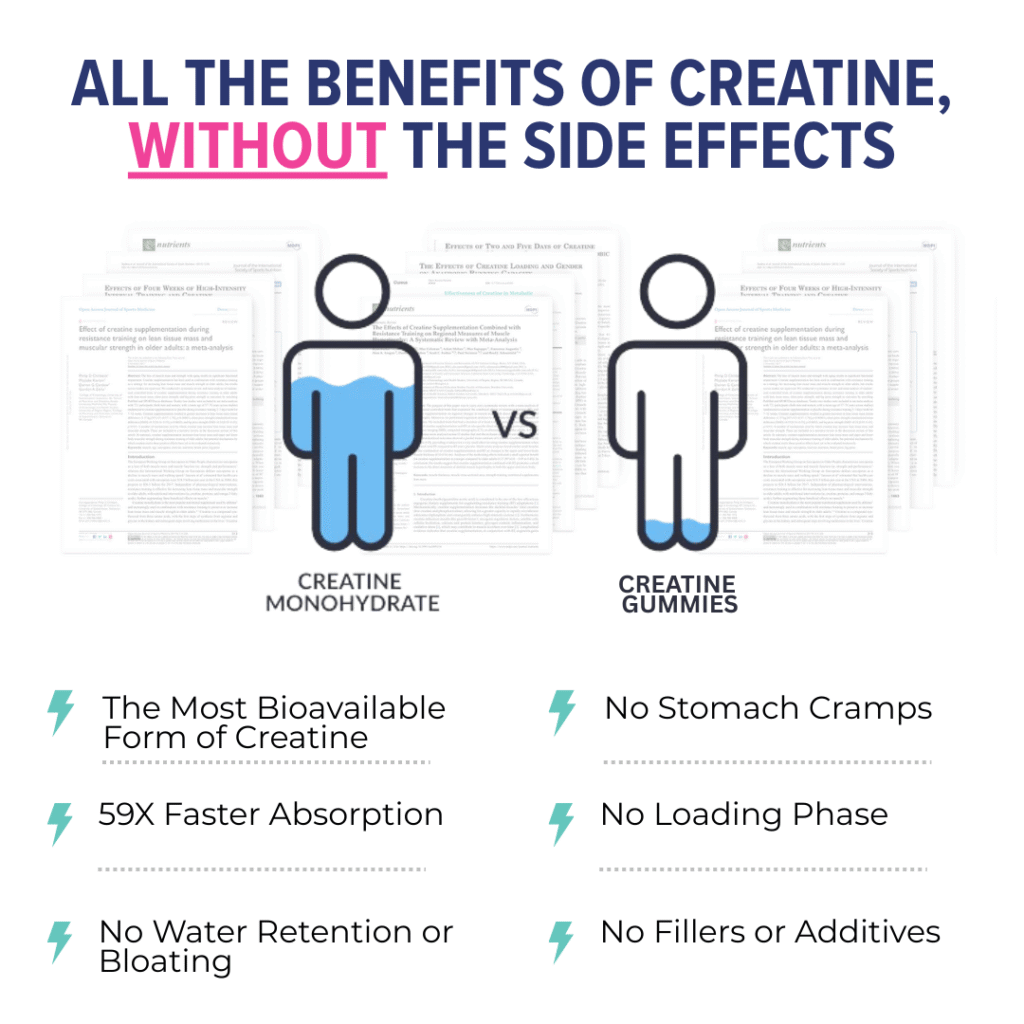
We spent almost a year in development with our sports science team and manufacturer to make sure we got this product just right!
We dove into the research on what types of creatine were based absorbed and how we could formulate to eliminate many of the traditional drawbacks of creatine.
Then we considered the delivery mechanism. Traditional powders require mixing, often taste bad, make precise dosage difficult and are hard to take with you.
The result is a gummy that is not only delicious, but cutting-edge in its formula.

1,000+ Athletes Trust Us





Most creatine supplements suck for runners because they’re not designed for the specific needs and challenges endurance athletes face.
Bodybuilders don’t mind grainy powders and they consider stomach distress a mild inconvenience.
But runners need convenience and something that is going to be easy on their stomach. GI issues are no joke when you’re miles from a bathroom.
That’s why we created MAS Creatine: creatine gummies designed for the needs of endurance athletes.
We’ve formulated our creatine monohydrate gummies to provide the purest and most effective form of creatine available, with no fillers or unnecessary additives.
Our gummies are…
So what you get is pure, fast-acting creatine that fuels your muscles, enhances your performance and helps you recover every time you train.
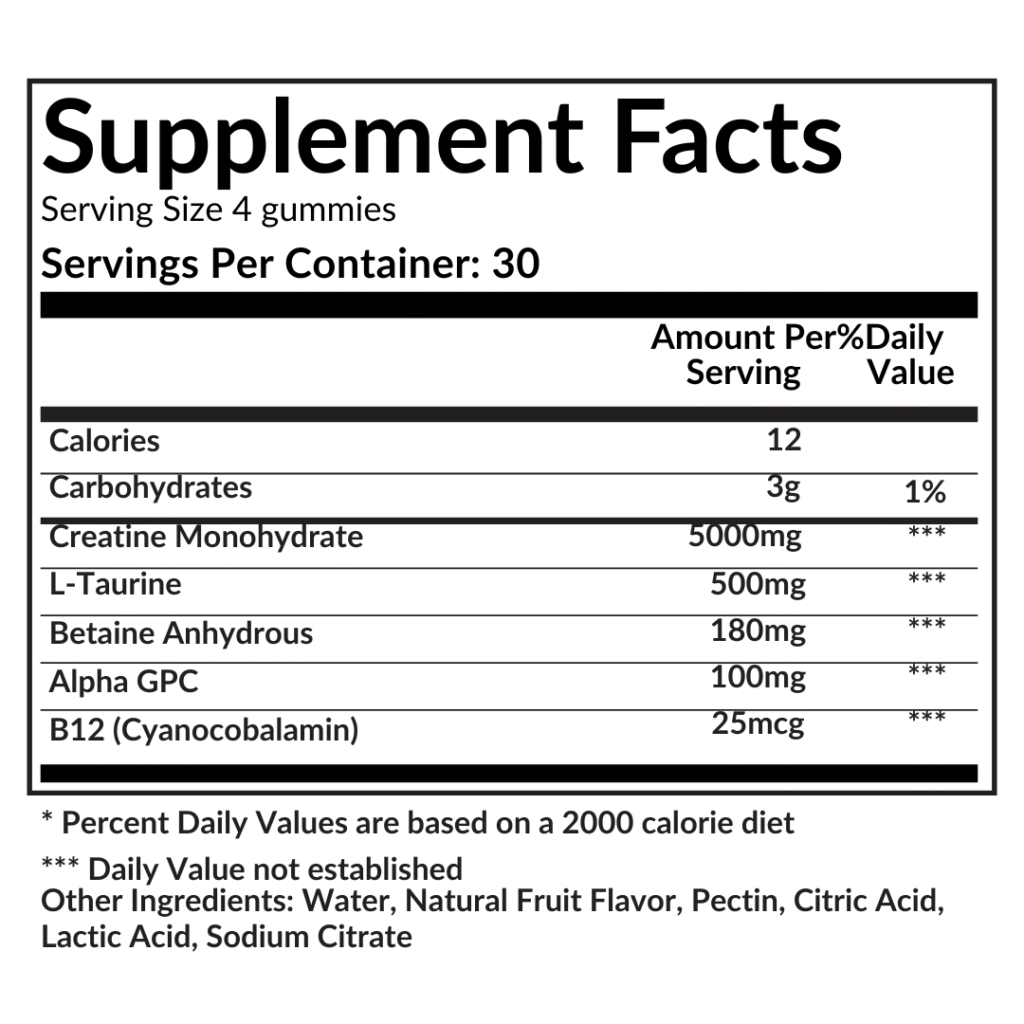
Research has consistently shown that 5 grams is the optimal dosage for most of the performance enhancing benefits.
4 MAS Creatine gummies will equal 5 grams of creatine monohydrate. Each tub contains 30 servings (120 total gummies).
Creatine can be taken at any time of the day and it can be split into multiple doses.
Creatine works best when the muscles are saturated, which usually takes 7-10 days.
This means consistency is more important than what time of day you take it.
Most research suggests that taking after a workout, rather than before, is a greater benefit once your muscles are saturated.
4.9/5.0 513+ Happy Athletes
Specifically formulated to be absorbed quickly without the bloated feeling you’ll find with traditional creatine powders.
Save Money & Stay Consistent When You Bundle
4.9/5.0 513+ Happy Athletes
Specifically formulated to be absorbed quickly without the bloated feeling you’ll find with traditional creatine powders.
Save Money & Stay Consistent When You Bundle
Most creatine supplements suck for runners because they’re not designed for the specific needs and challenges endurance athletes face.
Bodybuilders don’t mind grainy powders and they consider stomach distress a mild inconvenience.
But runners need convenience and something that is going to be easy on their stomach. GI issues are no joke when you’re miles from a bathroom.
That’s why we created MAS Creatine: creatine gummies designed for the needs of endurance athletes.
We’ve formulated our creatine monohydrate gummies to provide the purest and most effective form of creatine available, with no fillers or unnecessary additives.
Our gummies are…
So what you get is pure, fast-acting creatine that fuels your muscles, enhances your performance and helps you recover every time you train.

Research has consistently shown that 5 grams is the optimal dosage for most of the performance enhancing benefits.
4 MAS Creatine gummies will equal 5 grams of creatine monohydrate. Each tub contains 30 servings (120 total gummies).
Creatine can be taken at any time of the day and it can be split into multiple doses.
Creatine works best when the muscles are saturated, which usually takes 7-10 days.
This means consistency is more important than what time of day you take it.
Most research suggests that taking after a workout, rather than before, is a greater benefit once your muscles are saturated.
Try MAS Creatine and if you don’t love it or you’re unhappy for any reason, just let us know via email or phone and we’ll refund your money. No product return needed or complicated policies.
Experience the benefits of a healthy gut, better digestion and no more bathroom fears
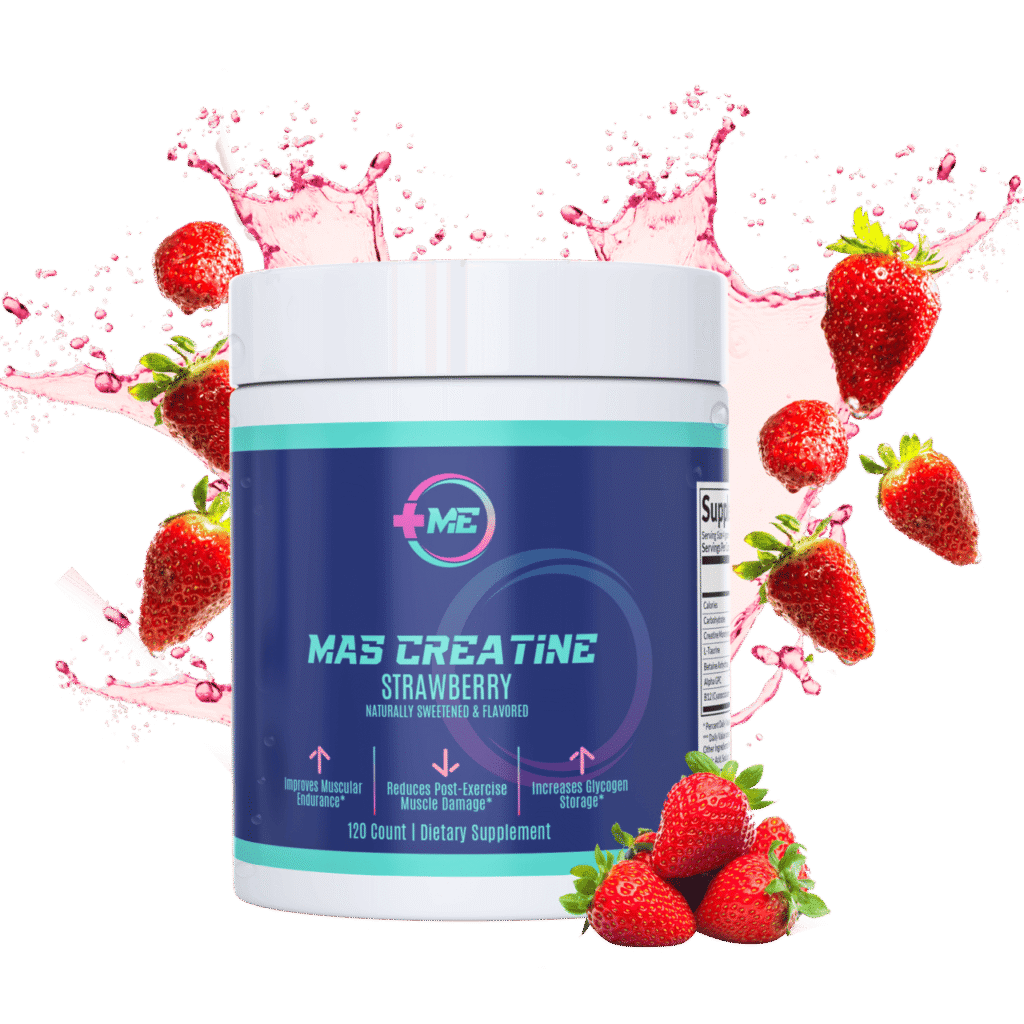
Creatine is by far one of the most well-researched supplements and widely considered the most effective, legal performance supplement.
There has been little, if any, research that indicates athletes and older adults won’t benefit in some way from taking creatine.
If you have tried creatine before, but had issues, our gummy formulation is much more gentle on the stomach, which results in significantly less gut issues as well as reduces bloating.
Creatine can be taken at any time of the day and it can be split into multiple doses.
Creatine works best when the muscles are saturated, which usually takes 7-10 days.
This means consistency is more important than what time of day you take it.
Most research suggests that taking after a workout, rather than before, is a greater benefit once your muscles are saturated.
Research has consistently shown that 5 grams is the optimal dosage for most of the performance enhancing benefits.
4 MAS Creatine gummies will equal 5 grams of creatine monohydrate. Each tub contains 30 servings (120 total gummies).
There is some recent literature that dosages as high as 20g are safe and can have enhanced cognitive benefits.
There used to be a belief that you needed to “load” creatine to achieve the maximum benefits, but more recent literature has suggested this is no longer the case.
Loading simply causes the creatine to accumulate faster in the muscles and thus the benefits to “kick in” faster.
The standard loading protocol found in the scientific literature is 20 grams per day for 5 to 7 days, followed by a maintenance dosage of 5 grams per day.
In the case of our MAS Creatine gummies, that would be 4 servings per day for the first 5 to 7 days.
Recent studies demonstrating that creatine is just as effective for women as it is for men at enhancing strength, lean mass, and muscular endurance, a 2021 study published in Nutrients also highlighted that creatine can help women…
There are very few negative interactions found in the research literature between creatine and any specific medical conditions or medications.
That said, there may be some, and thus you should always talk to your doctor if you’re currently taking medication and want to consider taking our creatine gummies.
Research shows that creatine works best when your muscles are fully saturated, which means being consistent with your intake.
While it will take a couple of weeks for your muscles to fully saturate, once at these levels the recommended 3-5 grams per day will allow you to maintain saturation and experience the full performance-enhancing benefits.
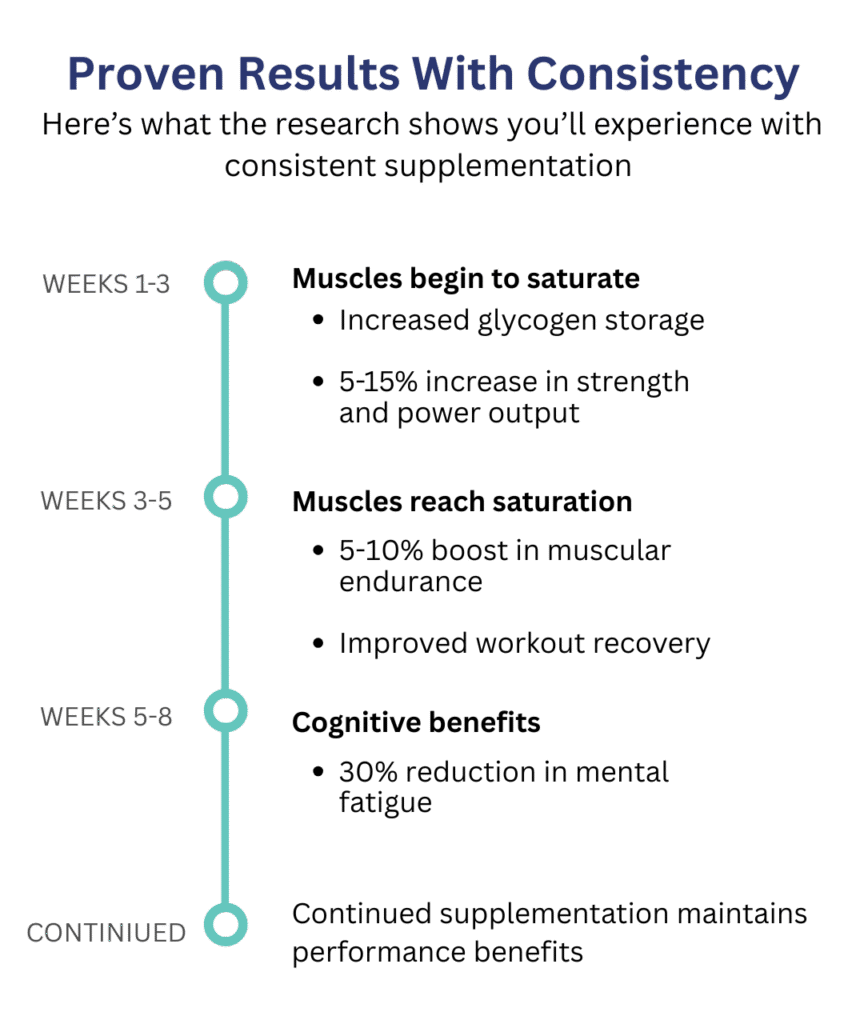
4.78
/5Based on 9 rating(s)
07 Customer(s) recommended this item
So I don’t know what’s working but I am feeling stronger!!!Only been doing gummies for 5 days but what a difference…also doing MAS performance & NAD….amazing!!!So I will probably do a subscription…Thank you!!!! So excited to tackle Tokyo with you!!!
This is my 3rd order. I started taking creatine after watching a lot of the guests on Joe Rogan talk about the benefits, but I always had tons of stomach issues. I tried a few brands but they all made my stomach angry. I thought I’d give a gummy a try after reading they may be more gentle on the stomach. So glad I did. These taste great and I’ve had no stomach issues.
The MAS Edge creatine gummies are great! I’ve tried other creatine gummies and other chewables tablets and MAS Edge are in a class by themselves! Actually pleasant! They are so good, in fact, I’m questioning whether they could really have the amount of creatine as promised.
I tried creatine last year when it seemed like every podcast I listened to was talking about it. But I really hated the taste and having to remember to mix it with something especially on days I didn’t train. I stopped taking for a while and then when I heard about gummies I thought Id try again and these are so much better. I love the strawberry and they are my after dinner sweet tooth fix. I just have to make sure my 5 year old doesnt steal them
The first day I took these gummies I could definitely feel something. I can't describe it, but just like I had more energy but also a little weird. This passed after the third day and now what I notice is I am not as tired in the morning after my gym treadmill and I feel like my muscles are more full. I'm 67 years old, so full muscles don't mean much now but I wish i had this in my 20s!
Creatine is by far one of the most well-researched supplements and widely considered the most effective, legal performance supplement.
There has been little, if any, research that indicates athletes and older adults won’t benefit in some way from taking creatine.
If you have tried creatine before, but had issues, our gummy formulation is much more gentle on the stomach, which results in significantly less gut issues as well as reduces bloating.
Creatine can be taken at any time of the day and it can be split into multiple doses.
Creatine works best when the muscles are saturated, which usually takes 7-10 days.
This means consistency is more important than what time of day you take it.
Most research suggests that taking after a workout, rather than before, is a greater benefit once your muscles are saturated.
Research has consistently shown that 5 grams is the optimal dosage for most of the performance enhancing benefits.
4 MAS Creatine gummies will equal 5 grams of creatine monohydrate. Each tub contains 30 servings (120 total gummies).
There is some recent literature that dosages as high as 20g are safe and can have enhanced cognitive benefits.
There used to be a belief that you needed to “load” creatine to achieve the maximum benefits, but more recent literature has suggested this is no longer the case.
Loading simply causes the creatine to accumulate faster in the muscles and thus the benefits to “kick in” faster.
The standard loading protocol found in the scientific literature is 20 grams per day for 5 to 7 days, followed by a maintenance dosage of 5 grams per day.
In the case of our MAS Creatine gummies, that would be 4 servings per day for the first 5 to 7 days.
It works equally well for men and women and our gummy formulation doesn’t cause increased water retention, so there’s no reason not to.
There are very few negative interactions found in the research literature between creatine and any specific medical conditions or medications.
That said, there may be some, and thus you should always talk to your doctor if you’re currently taking medication and want to consider taking our creatine gummies.
Please email us at support@masedge.com with the word “Cancel Order” in the subject line. Please note that we cannot guarantee order cancellation as we ship very quickly – but we’ll do our best.
At this time, we are unable to make any changes or edits to orders once they have been shipped – this includes the shipping address. Please review your information before completing your order.
Many companies offer a money-back guarantee because they know the majority of dissatisfied customers aren’t going to go through the hassle of actually returning the product to get their money back.
We don’t play these games because we don’t have to, the quality of our products makes it unnecessary.
If you order any of our supplements for the first time and don’t like it, you can keep it. Just notify us and we’ll give you a full refund. No complicated forms and no return necessary.
To protect ourselves from fraud, the It’s-On-Us guarantee is only valid for first-time purchases of a product, and redeemable up to 365 days after purchase. If you bought more than one supplement and weren’t happy with your purchase, in some instances, we may ask that you send the products back to us for a refund. Don’t worry though, you’ll never have to pay for return shipping.
Yes, just login to your account here and you’ll be taken to the subscriptions page where you can modify your preferences.
Most US orders arrive within 3 to 5 business days, but can take up to 7 business days.
Orders to Canada and the UK usually arrive in 10 to 14 days. Orders to other countries generally arrive within 14 to 21 days. Customs clearance may add a few extra days to this as well.
Yes, you will receive a tracking number via email.
Some orders get marked as delivered by our fulfillment house when they’re actually a day or two away.
If your order hasn’t arrived within two business days of being marked as delivered, contact us and we’ll help you out.
Unfortunately, we can’t ship to some countries because they’re very strict on what supplements they will and won’t allow to cross their borders, and too many customers were losing their orders.